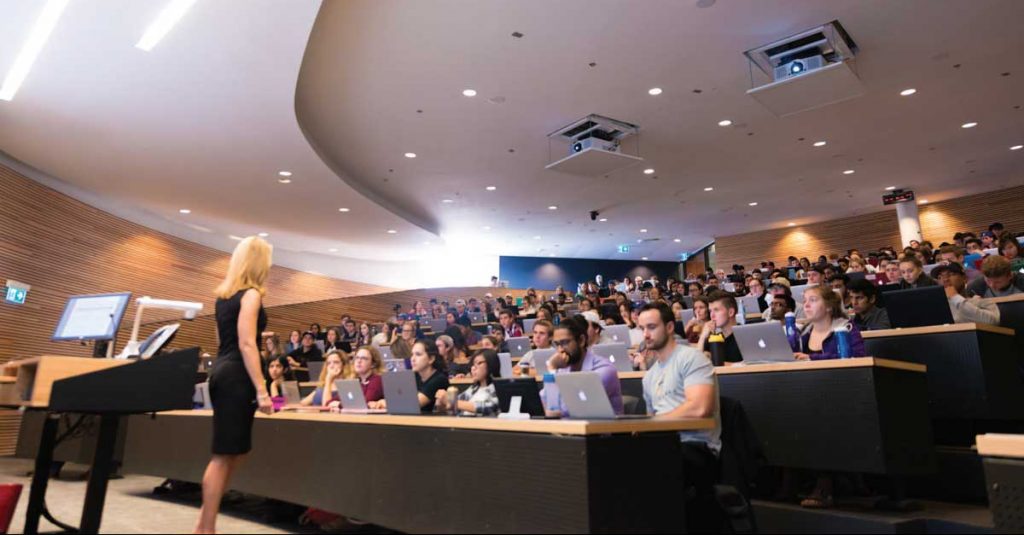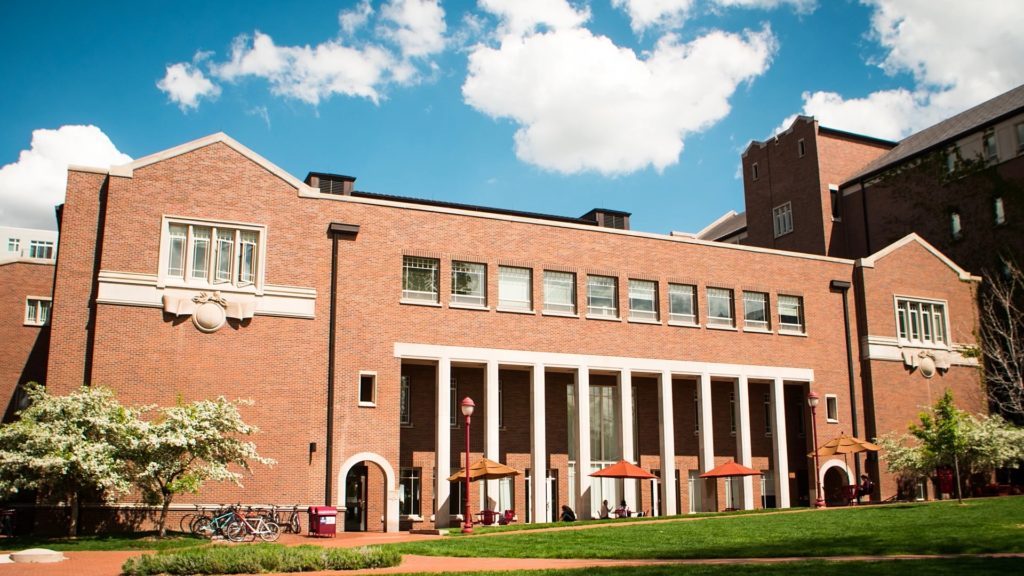Babson Entrepreneurship Stays at #1 for 25 Consecutive Years

For the 25th year in a row, U.S. News & World Report ranked Babson College’s F.W. Olin Graduate School of Business as the number one program for entrepreneurship in the United States. Entrepreneurship is an indelible part of the business school and MBA program, found within the curriculum, faculty, clubs, centers, and more.
Babson’s Entrepreneurship Curriculum
At Babson, the 50-plus faculty members and 30 adjunct entrepreneurs—the largest dedicated entrepreneurship faculty in the world—come together to teach Entrepreneurial Thought & Action®. This methodology is a way to balance action, experimentation, and creativity with business fundamentals. The goal is to empower students to take action on social, economic, and environmental issues to create value. Students are taught to apply ET&A™ in everything from large corporations to running a charity, solving social issues, and starting a business.
In addition, at Babson, there’s the idea that “we are all entrepreneurs,” which falls under the Entrepreneurship of All Kinds® heading. This concept re-imagines entrepreneurship to include all brilliant improvisers, not just startups, venture capital firms, and business incubators. It looks at how every organization can use entrepreneurship to creatively solve problems and adapt to change.
Both ET&ATM and Entrepreneurship of All Kinds® are interwoven into the very fabric of Babson, being taught in every classroom and every topic.
Babson’s Entrepreneurship Focus
Outside of the curriculum and academic philosophy of Babson, entrepreneurship can be found in dedicated centers and other resources. For example, the school is home to the Arthur M. Blank Center for Entrepreneurship, which helps to accelerate the practice of entrepreneurship through mentoring, competitions, events, workshops, and more. This Center is the hub of the entrepreneurial ecosystem.
There’s also the John E. and Alice L. Butler Launch Pad, which hosts two signature entrepreneurship events every year: the Rocket Pitch and B.E.T.A. Challenge both of which bring together students and alumni to compete in business innovation. The Launch Pad is also responsible for the Summer Venture Program, which accelerates the top 15 student ventures at Babson each year.
To gain more in-depth insight into Babson’s entrepreneurial focus, we had the opportunity to interview Keith Rollag, the Dean-Elect of the Graduate School (starting July 1). He was able to talk to us about how Babson has been able to stay as the number one program for entrepreneurship for 25 years as well as what that looks like at the university.
-
How has the Babson MBA managed to maintain the #1 entrepreneurial slot for so long?
There are several reasons; some of it comes from our first-mover advantage. We taught our first course in entrepreneurship in 1967, and created the Center for Entrepreneurial Studies in the 1970’s at a time when entrepreneurship wasn’t really accepted as a separate business discipline. We started the Babson Entrepreneurship Research Conference in 1981 (which continues to be one of the premier conferences for entrepreneurship) and the Price-Babson Symposium for Entrepreneurship Education in 1984, which over the years has taught almost 5000 educators from over 1000 institutions and 80-plus countries how to teach entrepreneurship.
But our #1 ranking is also due to the creation of a Babson community, culture, and curriculum that is built around entrepreneurship. Entrepreneurship has been an important part of our curriculum since the 1980’s, and we’ve built what we think is the largest entrepreneurship department in the world with over 50 full-time and adjunct faculty members.
Entrepreneurship has been a part of our Babson DNA for decades, and we live it as well as teach it. We are constantly updating our curricula, trying new things, building new partnerships, and exploring new opportunities. The term Entrepreneurial Thought and Action is the latest embodiment of this spirit, and it aptly implies the energy and enthusiasm that is an integral part of Babson.
-
Why do you feel that Entrepreneurial Thought & Action is vital to an MBA education?
At its core, Entrepreneurial Thought and Action is all about rapid learning, and in today’s dynamic world of uncertainty, whoever learns fastest wins. We teach our students to know when to learn quickly through analyzing, strategizing, and planning, and when to learn quickly through prototyping, experimenting, interacting with customers. Both are critical for success, but our education and reward systems tend to favor thinking and discussing over acting. We know from the habits of successful entrepreneurs that in times of high uncertainty, action (and the learning that comes from it) is the best way to solve problems and take advantage of emerging opportunities.
In our Babson MBA programs, we help students develop both a mindset and habit of learning through action. This is valuable whether you are trying to lead innovation within large corporations, grow and expand small and medium-size businesses, create new ventures, or simply find new ways to address complex-but-important problems facing communities, regions, and the world.
Learning quickly is a skill that will always be valued by organizations. While markets, technologies, structures, and roles may change, the need for a manager to learn quickly will never go away.
-
What aspect of your entrepreneurship studies/opportunities/focuses would you like to highlight?
We do many things under the broad heading of “entrepreneurship of all kinds.” Students have the opportunity to participate in intensity tracks around entrepreneurship (where they can build their venture while they are getting an MBA), women-led entrepreneurship, social innovation, and technology development. We also have the Butler Launch Pad as well as our highly competitive Summer Venture Program that helps start dozens of ventures (both business and social-focused). And our MBA students have several clubs focused on regional entrepreneurship and host well-attended conferences on United States, Asian, Indian, and Latin American entrepreneurship.
Whether one is considering starting a company or looking to lead ventures within larger organizations, or just wanting to maximize their impact on the world, an entrepreneurial, can-do, action-oriented mindset primes everyone for success.
What Toronto MBA Can You Earn in the Least Amount of Time?

It’s easy to see why earning an MBA could be a huge boost to your career—but if the thought of putting those things on hold for two years while pursuing your degree is a source of great anxiety, you are not alone. Many who might otherwise have the ambition and skills to thrive in an MBA program may simply not have the option of putting their life on hold for two years and enrolling in school full-time. This can mean that many talented and driven individuals won’t have access to the kind of opportunities for advancement and growth that an MBA provides.
Not every MBA program requires two years of full-time work. But part-time and weekend programs can often have the opposite problem for individuals eager to earn their degree and reap its benefits. While such programs allow students to continue working full time while earning their degree, they can often take up to three years or more to complete.
For individuals driven to earn their degree quickly, there are a number of programs that allow students to earn an MBA in under one year, reducing the amount of time without an income and moving allowing for a quick path to the salary increase and advancement opportunities an advanced degree is likely to offer.
In Toronto, many top business schools offer accelerated or abridged versions of their MBA programs that can be completed in as little as eight months.
The Fastest Toronto MBA Programs
Ivey Business School – Western University Canada
The Accelerated MBA at the Ivey Business School is available for students who have recently graduated from Ivey’s HBA program, allowing students to earn their degree in just eight months—without needing to take the GMAT exam. This makes it not only among the fastest Toronto MBA programs you can find, but also among the most unique.
The program takes place over the course of eight months, building on the base of knowledge earned during the HBA program. The courses are designed to refresh students on business fundamentals, while also providing career-centered electives in fields like marketing, finance, entrepreneurship, and more. The program also allows students to pursue study abroad through an optional trip to China, South East Asia, or South America.
The benefits of Ivey’s Accelerated MBA are evident for graduates: 97 percent of students earned an offer of employment by within three months of graduating, reporting an average post-graduate salary of $107,116. About 65 percent of employment offers were also facilitated by the university, demonstrating the indelible benefits of the connections made while in school.
DeGroote School of Business – McMaster University
The DeGroote School of Business at McMaster University also offers an Accelerated MBA for students graduating from a Canadian university with their undergraduate degree in business. Attending full-time, the program can be completed in as few as eight months, making it one of the most time-efficient MBAs available to students in Canada.
By exempting students from the required first year MBA courses, students can earn their degree quickly while also cutting their overall tuition expenses in half and accelerating their path to employment. The program is designed for students who have earned their undergraduate business degree in the last ten years, and have at least one year of professional experience. Students may start the program in either September or January.
Wilfrid Laurier University – Lazaridis School of Business & Economics (Toronto Campus)
The One-Year MBA at Wilfrid Laurier’s Lazaridis School of Business & Economics is a unique program that immerses students fully in an integrated model of business education, asking students to constantly make use of the knowledge gained during the program through team projects, case study analysis, and as consultants for a real business. The degree is designed for graduates from any four-year university with at least two years of professional work experience.

Wilfrid Laurier University also offers one of the fastest MBAs you can earn in Canada, with the One Year Lazaridis School of Business & Economics MBA.
The Lazaridis MBA can be completed in just twelve months, offering one of the best return on investments of any Canadian MBA program. Located in Waterloo, a center of technology and finance within Canada, the One-Year MBA also allows students to choose from over 10 different MBA concentrations, such as entrepreneurship, strategic management, supply chain management, and organizational behavior.
Schulich School of Business – York University
The Schulich School of Business‘ Accelerated MBA allows students to bypass many of the Year 1 MBA requirements, cutting the time it takes to complete the degree by half. The program can be pursued either on a full-time or part-time basis, and can be completed within just eight months with the full-time option. The program is reserved for students who have earned a BBA or BCom degree in Canada within the past ten years. With 89 percent of all Schulich MBA students earning a job offer within three months of graduation from their respective programs, the Accelerated MBA gives students the chance to join the workforce much sooner and quickly reap the benefits of their education.
Rotman School of Management – University of Toronto
For prospective MBAs with several years of professional or managerial experience, another way to quickly earn an MBA is by pursuing an Executive MBA, designed specifically for senior managers and executives. Executive MBA programs, such as the One-Year EMBA at the University of Toronto’s Rotman School of Management, can typically be earned in 13 months or less and are designed to accommodate the schedule of a busy professional. While executive programs typically cost more than other MBA variations, the Rotman One-Year MBA stands out as the fastest EMBA you can earn in the Toronto metro.
Inside the Relaunch of the Berkeley Entrepreneurship Association

Entrepreneurship at the Haas School of Business at UC Berkeley is getting an upgrade. Right now the university is working to rebrand and relaunch the Berkeley Entrepreneurship Association (BEA). While the newly updated BEA isn’t available yet, it’s in the works and will have many exciting announcements over the next weeks and months.
We were lucky enough to get an inside look at what’s coming to the BEA in a talk with Luca Cosentino, MBA’19, the President and Co-Chair of the BEA and the man behind the re-launch. Here’s the inside scoop!
MetroMBA: What is the Berkeley Entrepreneurship Association (BEA)?
Luca Cosentino: The Berkeley Entrepreneurship Association is meant to be the one-stop shop for entrepreneurship at Berkeley. Ideally, everything that happens around entrepreneurship should be coordinated or monitored by the BEA. It’s not just for business school, but also for students across the campus. It’s the umbrella under which all entrepreneurship initiatives, partners, mentors, funding, and resources will rest.
The BEA has been at Berkeley for a while as a collaborative effort, and it did a great job before, but we are adding to it. Prior to this relaunch, the BEA focused on one-off events and bringing founders to school. They did a great job regarding inspiring people to entrepreneurship. We want to keep doing what they did—the education side—but add the practical side. In this sense, the innovation is massive.
We are rebranding BEA. We are moving from one-off events to something that the potential to be around for twenty years and could be translated into a core university program matching what the University currently offers on entrepreneurship.
The one thing I want to underline is that is that every university has entrepreneurship programs where you’re matched with other people, but the value here is that we’re connecting people from different schools around the community of entrepreneurship. We are working to build the entrepreneurial community at Berkeley. The value of this community is that it won’t be agnostic to one specific initiative but will serve as an umbrella for all.
MM: Why is the BEA important and what is its goal?
LC: Before getting started with BEA, I spoke to a number of people from different business schools around the country. I wanted to know how each school dealt with entrepreneurship and how it was defined. What I noticed was that there were a bunch of great resources for helping students understand what entrepreneurship is, but it was really hard to find programs that helped students move from zero to one—from a basic idea to “Okay, let me try.” Students have access to many great initiatives where they can brainstorm and talk about their ideas, but to move from an idea to start effectively doing something around that idea is a completely different story.
We believe that if we give business students all the weapons and tools they need to start working from day zero, it’s going to have a massive impact on everyone’s career.
We also noticed that, too often, schools separate skills. For example, the computer science department is separated from the data scientist group and the information group. But we all know that entrepreneurship, great ideas, and great companies come from different skill sets, backgrounds, and diverse teams. We want to encourage that.
A student’s life is busy. Their schedule is packed, so going out and finding people that you like and that you want to work with that are aligned with your ideas is pretty difficult. We want to make this process faster. We believe that this is a great value we’re going to bring to students.
The application of the BEA is very big and far-reaching. There’s a strong impact on entrepreneurship itself, but also for employers and students. We all know that employers are keener to hire people from an entrepreneurial background. There’s a definite advantage for companies who bring on employees who have gone through capitalist discovery, testing, etc. This program really offers 360 degrees of benefits.
CA: What will the BEA offer?
MM: As an organization, we have a few missions starting this year and moving into next year.
-
Encourage Entrepreneurship
Our first mission is to encourage people to start companies. When you think about the typical MBA student who takes two years off to come to school and study, their main goal is to gain more experience and skills. Many MBA students also come to business school because they want to do something different, or possibly, follow their passions. But, when it comes to business school, entrepreneurship, generally, has a less relevant place compared to companies who offer internships or full-time positions. What we’re trying to do is encourage students to start companies and give entrepreneurship a try.
-
Create Entrepreneurial Collaboration
The main innovation that I’m most excited about and what we’re working hard to start in the fall is a program that connects students and individuals from across different schools and different backgrounds. For the first time in Berkley’s history, it will be an initiative led by students and coordinated across different schools. I believe it will be the largest program ever created at Berkeley connecting technical and business students, student clubs, VCs, mentors, funding sources, and institutions.
The goal of the program is to take great ideas and start them along the process, through customer discovery to business model evaluation. The steps are as follows:
- First, the program will allow people to present their innovative ideas.
- From there, the BEA would match the idea to a team of three or four people with different interests.
- Then, over three to four months, that team would work together to gather every resource they need to transform the idea into a workable concept company.
Currently, the program name has not been announced, but it will be released in a few weeks. For now, everything has already been put in place, and Berkeley is ready to launch their first cycle in Fall 2018.
-
Connect the Entire Entrepreneurial Community
The next focus for the BEA is to connect students with startups. There are many students and MBAs who are not 100 percent keen to start their own company but are curious about what it’s like. Our goal is to offer them a part-time experience, while in school, that offers them a unique chance to test their skills in a start-up environment.
Part of this focus will also be to connect the startup ecosystem at Berkeley. That means connecting startups, accelerators, VCs, etc. Already, we have collaborations with many different communities including:
- Participating Clubs: Computer Science Undergrad Association (CSUA), Computer Science Graduate Association (CSGSA), FemTech, Mobile Developers at Berkeley, Data Science Society, Upsilon Pi Epsilon Computer Science Honor Society, and many more coming.
- Collaborations: Xoogler community (community of ex-Googlers), Google Launchpad, Startup Grind, Dorm Fund, Sutardja Center for Entrepreneurship, SkyDeck Startup Squad, Citris Foundry, Food Club, and more.
-
Entrepreneurial Education
Finally, the last thing we’re launching is an educational program that will include courses, a new website, a new blog, and a new podcast (all launching soon) that will include information from entrepreneurs, venture capitalist, product managers, blockchain, and more.
Other educational programs that we will be launching include:
- A cross-schools educational event that we hope will help bridge the cultural gap between students in different schools.
- Life as an Entrepreneur: a seven-week class with a variety of speakers including founders, VCs, etc.
- Educational events around hot technical topics.
Currently, the Berkeley Entrepreneurship Association is still in its early relaunch phase. The newly updated website will be up in the next few weeks so check back on the school website and the Berkeley Haas Entrepreneurship Program regularly to catch its launch.
Showdown: Find Out if You Should Get an MBA in New York City or Los Angeles

The battle for hip-hop supremacy may have ended in the ’90s, but we can keep the East Coast-West Coast beef alive while looking at full-time MBA programs in New York City and Los Angeles.
Both cities are home to top business schools and are ripe with employment opportunities in booming industries. But which is best for you? Let’s take a deeper dive.
Location
We’ll start with location, location, location.
The most bustling city in the country, NYC is is the capital of the business world. More Fortune 500 companies are headquartered here than in any other city. The city is not only home to Wall Street and the world’s largest financial institutions, but also some of the largest media, marketing, and advertising companies. While New York City can be daunting in its size, it’s also furiously expensive to live in, so it may not be for everyone. Getting to know the city’s vast public transportation system is a must and it can get pretty cold in the winter, so if you’re looking for beaches, keep reading.
Meanwhile, LA is Tinseltown. The city’s economy is driven by entertainment industries like television, film, video games, music recording, and production, but also by international trade, technology, petroleum, fashion, apparel, finance, telecommunications, and tourism. In the 2017 Global Financial Centres Index, Los Angeles was ranked as having the 19th most competitive financial center in the world, and sixth most competitive in United States. The city is also the largest manufacturing center in the western United States, with the ports of Los Angeles and Long Beach comprising the fifth-busiest port in the world and a vital trade route within the Pacific Rim.
New York City Full-Time MBA Programs
Full-time MBA Programs in New York City include:
- Stern School of Business – New York University
- Gabelli School of Business – Fordham University
- Columbia Business School
- Zicklin School of Business – Baruch College
What stands out about these programs?
A Columbia MBA opens up countless career options and is sure to pay off in the long run: The average starting salaries for Columbia MBAs is $104,000, with 37 percent of full-time MBA of graduates being employed in the financial services industry.
Meanwhile, Stern’s MBA curriculum gives students tons of flexibility, and allows degree seekers to choose one or two MBA specializations, NYU allows up to three specializations from 20 plus options.
Both Gabelli and Zicklin’s full-time programs feature cohort-based structures. Gabelli’s program features a New York immersion experience where, over the course of five days, students are exposed to a number of company visits with corporations like Deutsche Bank, Money.net, and Hewlett Packard. As an alternative to completing a major, Zicklin students may pursue a joint JD/MBA in conjunction with Brooklyn Law School or New York Law School.
Los Angeles Full-Time MBA Programs
Full-time MBA Programs in Los Angeles include:
- Anderson School of Management – UCLA
- Argyros School of Business – Chapman University
- Graziadio School of Business and Management – Pepperdine University
- Marshall School of Business – USC
- Peter F. Drucker and Masatoshi Ito Graduate School of Management – Claremont Graduate University
What’s special about these MBA programs?
Anderson features a Business Creation Option for MBAs, which gives students the chance to start their own businesses while still in school. Meanwhile, the Special Project Option challenges groups to tackle problematic issues that impact an entire industry.
Chapman’s full-time MBA curriculum features three main components—core/required courses, a capstone course, and elective courses. Students have several track options available to concentrate their studies, including: Corporate Finance, Marketing, Investment Management, Entrepreneurship, Information Systems in Digital Times, and more.
Graziadio full-time MBA students have the option to spend a trimester abroad in the fall term of their second year at one of Pepperdine’s partner universities in Africa, Asia, Europe, Latin America, or Oceania.
USC MBAs have required study-away coursework called PRIME International Experiential Learning, a 10-day site visit overseas. Students must complete industry—and company-oriented recommendations in capstone projects that incorporate concepts from global strategy and global economics.
At the Drucker School, students may choose two areas of concentration to focus their studies, and select elective within these areas of concentration. Concentrations are offered in: Strategy, Finance, Marketing, Leadership, Global Management, and Information Technology Management.
Jobs and Salary
When it comes to job placement, both New York and Los Angeles have their perks.
New York is home to business school with the highest job placement rate: Around 97 percent of Columbia Business School graduates receive offers within three months of graduation. The school’s class of 2016 boasted an average starting salary of roughly $125,000 plus a $25,000 signing bonus. The top three industries that employ Columbia graduates are financial Services (37 percent), consulting (35 percent) and technology/media (10 percent).
Check out a complete breakdown of NYC salaries and employment opportunities, give our guide to getting paid in New York a read.
While Silicon Valley has a reputation for being the prime place for MBA jobs in California, LA has been catching up recently—and fast. Los Angeles has embraced the tech boom in a big way, with many Valley bigwigs and new startups alike moving their operations to Silicon Beach. With that in mind, the new era of LA innovation is creating some lofty starting salaries, particularly for MBA graduates.
Recent UCLA Anderson graduates earned an average starting salary of $121,250 with a $25,000 signing bonus, according to statistics released by the school. The top five industries to employ Anderson MBAs are in tech (30.6 percent), financial services (21.6 percent), consumer products (13.4 percent), and consulting services (13.4 percent).
Check out our guide to the highest MBA salaries in Los Angeles for more information.
MBA and Innovation: Our 4 Favorite Denver Schools for Entrepreneurs

Colorado’s population and economy have been rapidly expanding in recent years. The Denver Post estimates that, by 2050, Colorado’s population could increase to 8.5 million people: a 64 percent increase from the current population of 5.5. The economic and population boom make Denver an ideal place to launch a business. Denver is also less than an hour from Boulder, a city Inc. Magazine refers to as “America’s Startup Capital.” All in all, Denver metro is starting to look like a no-brainer for budding entrepreneurs.
But turning an idea into a company involves making infinite difficult decisions about business issues and strategy. According to Forbes, 90 percent of start ups eventually fail. Earning an MBA means gaining access to business networks, knowledge, and resources, and it can be an excellent way to gain the edge you need in order to help your idea thrive. Below, we’ve laid out four of our favorite Denver MBA programs for entrepreneurs.
University of Denver – Daniels College of Business
Students who want to start a business would be remiss not to consider the University of Denver’s Daniels College of Business, which was recently listed among Inc. Magazine’s “15 Most Innovative MBA Programs.” Forbes also ranked University of Denver in the “Top 50 for Startups” as recently as 2014. Daniels grads have gone on to start their own companies, and to find creative ways to meet the needs of their community. Leo Osahor (MBA 2007, MSM 2007) developed FlightSpeak, the largest and most detailed airport app to date. The app allows travelers to view security wait times, shopping options and coupon offers, and WIFI info for 315 airports around the world. The school also helps sponsor an annual Pitch Competition that fosters entrepreneurship by allowing graduate and undergraduate students to present their company or product ideas to a panel of local business owners. Winners receive a $1,000 cash prize that lets them take steps toward bringing their ideas to fruition.

The Daniels College of Business/Photo via Daniels.edu
Colorado State University College of Business
The Colorado State University College of Business has an entire institute devoted to entrepreneurship. The Institute for Entrepreneurship offers several programs outside of the classroom that help budding entrepreneurs gain the insight and resources they need to embark on their business ventures. According to the school, the institute hosts annual events such as Women Entrepreneurs’ Leadership Summit, Venture Adventure Challenge, and the Distinguished Entrepreneur speaker series.
University of Colorado – Denver Business School
The University of Colorado’s Denver Business School MBA program provides the option of pursuing an entrepreneurship specialization. This specialization allows students to explore a breadth of topics including web development, personal branding, and social entrepreneurship. MBAs with this specialization devote 12 of their 15 elective credits to entrepreneurship-related courses. University of Colorado’s Jake Jabs Center for Entrepreneurship supplies students aiming to start their own business with additional resources, such as career coaching, networking, job recruitment, and internship opportunities.
University of Colorado, Boulder – Leeds School of Business
Students at the University of Colorado, Boulder’s Leeds School of Business will have no trouble accruing the knowledge and skills necessary to start their own business. Leeds students can pursue an MBA with an entrepreneurship focus. In fact, the school offers so many entrepreneurship electives, there are six sub-categories students can use to tailor their educational trajectory to their specific goals. Entrepreneurship MBAs can focus on New Venture Finance, Entrepreneurial Marketing, Entrepreneurial Practice, Sustainable and Social Entrepreneurship, Corporate Entrepreneurship, or New Venture Creation. Leeds School of Business has inspired innovators such as Brent Handler, the destination club pioneer who co-founded Exclusive Resorts.
The Week Ahead at the 2017 NBMBAA Conference in Philadelphia

Tuesday, September 26, marked the first day of the annual National Black MBA Association (NBMBAA) annual Conference & Exposition, held at the Philadelphia Convention Center. The five-day event, stretching to Saturday, Sep. 30, brings together entrepreneurs, business leaders, students, and other seasoned professionals into an immense, collaborative atmosphere that helps introduce next-level vision to the business world.
The center-piece of the event is the two-day Career Exposition. Touted as the “largest diversity career fair in the country” by the NBMBAA, the event brings together over 300 companies, government entities, nonprofits, and more brings together on-site stations and active recruitment, helping attendees potentially earn new employment. Well-established companies like Coca-Cola and Johnson & Johnson have previously attended the Career Exposition.

An inside look last year’s NBMBAA Career Exposition.
The conference is also highlighted by several notable guest speakers, including former CNN and Today Show personality Tamron Hall, celebrated sports journalist Kevin Blackistone, political strategist Symone Sanders, popular actress Tia Dashon Mowry-Hardrict, and many more.
Beyond the Career Exposition and illuminating figures attending, the five-day event is packed with almost too many world-class events to keep track of: from the Scale-Up Pitch Challenge that features $65,000 in cash prizes, to the first ever higher education exposition, and the black tie Impact Awards Dinner, which will feature the aforementioned Tamron Hall, Girls Trip star Larenz Tate, as well as local Philly icon D.J. Jazzy Jeff.
Over the next several days, the conference will also host countless industry discussion panels, with topics like: International Business: Doing Business in Africa—Entrepreneurship Meets Social Investment; Entrepreneurship: Taking the Franchise Route; Education & Workforce Development: Coalition Building—The Power of Partnership; Marriott Ownership Session: Investment and Ownership Opportunities in the Hotel Industry; Financial Prosperity: How to Retire by 40, and much more.
For information on the event, including schedule, registration opportunities, and more, head to the official National Black MBA Association website. Official NBMBAA members will receive a discount if they wish to attend the Philadelphia event.
